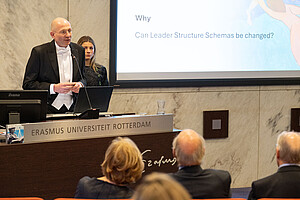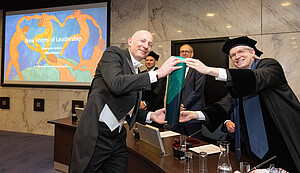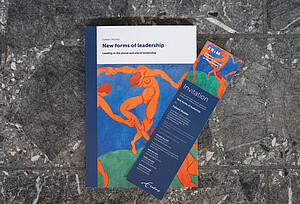PhD Defence Folkert Mulder

In his dissertation, New Forms of Leadership, ERIM’s Folkert Mulder explored how global developments had dramatically altered the business environment, creating a need for innovative leadership approaches. Folkert argued that traditional hierarchical leadership structures were no longer sufficient to address the complexities of modern organizations, which faced evolving demands, innovative business models, intricate supply chains, and rapid digitalization. Through his research, he highlighted the importance of moving beyond singular leadership models, thus advocating for a pluralistic approach where multiple leaders collectively navigate challenges, ensuring efficiency, transparency, and resilience. This shift towards a more distributed leadership structure enables organizations to better manage the dynamic and interconnected landscape, ultimately enhancing their ability to adapt and thrive in a rapidly changing world.
Folkert defended his dissertation in the Senate Hall at Erasmus University Rotterdam (EUR) on Friday, 1 March at 13:00. His supervisors were Prof. dr. Steffen Giessner (EUR) and Dr. Bas Koene (EUR). Other members of the Doctoral Committee were Dr. Bex Hewett (EUR), Prof. dr. Daan Stam (EUR), and Prof. dr. Marc Salomon (UVA).
About Folkert Mulder

Folkert Mulder’s primary role is to facilitate organizational transformation and strategy redirection. His special talent lies in establishing trust within organizations and in mastering group dynamics. Folkert has the experience and insight to understand what individuals and organizations need.
Folkert holds a Master's degree (honour of excellence) in Business Economics from Erasmus University Rotterdam, the Netherlands, and a Master's degree from INSEAD, Fontainebleau, France. Prior to founding his own company, Folkert worked as a consultant for an international consulting company involved in a variety of strategic and due diligence projects throughout Europe and the US. Facilitating organizational transformation and strategy redirection, Folkert has successfully supported companies in developing their business across industries and geographies. Examples include top-tier businesses in fast-moving consumer goods (FMCG), professional service firms, financial institutions and major energy companies in Europe, Asia and the Americas. Besides managing strategy formation and organizational development, Folkert facilitated several post-merger integration processes within different industries. He works for management boards and staff, but also advises shareholders and supervisory board members.
Besides working for a wide range of first-class companies and management teams, Folkert facilitates top-flight sports teams. Teams he inspired to excel were a golf team that won the World Championship in 2006, a sailing team that was the HCP winner of the prestigious Sydney Hobart Rolex Yacht Race in 2008 and a Dutch field hockey team that became national premier league champions in 2011 and 2012. Folkert is part of the coaching staff of the Dutch men’s national field hockey team in preparation for the Olympic Games.
Folkert serves as a board member of the Erasmus Centre for Leadership at Rotterdam School of Management and of the Development Board of the Erasmus Trust Fund Foundation. Folkert lectures at Erasmus University Rotterdam on the MBA and Executive Programs on organizational change.
Thesis Abstract

The increasing complexity of society and the business environment results from numerous interconnected global developments that have shaped the landscape in which organizations operate, such as evolving demands, innovative business models, intricate supply chains, and the rapid pace of digitalization. With that, leaders encounter new challenges questioning the so-far advocated leadership styles and skills, which is crucial in navigating and harnessing the potential of the complex and dynamic business landscape described.
In the face of changing market dynamics and disruptive new business models, effective leaders must embrace innovation, oversee, and optimize complex networks, ensure efficiency, transparency, and resilience, and collaborate with multiple stakeholders across geographical locations, and foster effective communication and coordination. More and more organizational trends are moving away from this traditional model of organizing towards, new forms of organizing across organizational boundaries, The needed leadership style often demands a different leadership setup and often more leaders involved to manage the complexity. Traditionally, leadership has been framed within a hierarchical structure, with a single leader at the top guiding their followers.
All of these changes lead to new ways of thinking about leadership, whereby we may need more than one leader to tackle the current problems, which has been referred to as leadership in the plural.
View photos of Folkert's PhD Defence
Photos: Michelle Muus / Michelle Muus Fotografie


